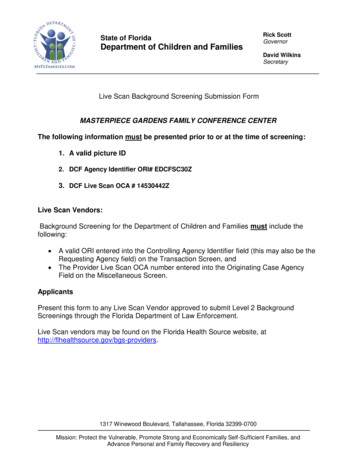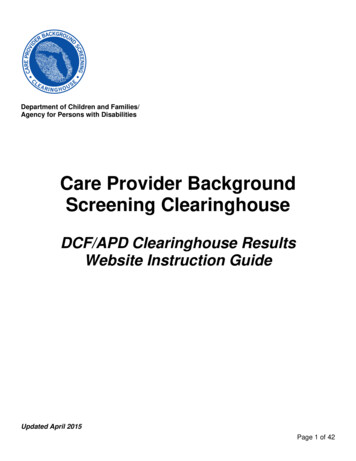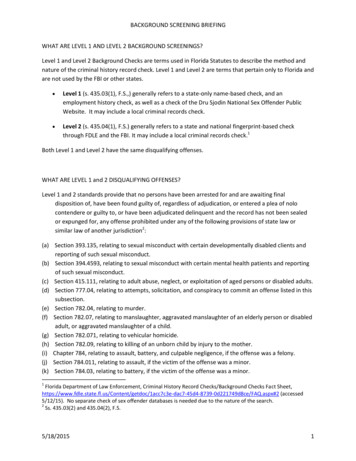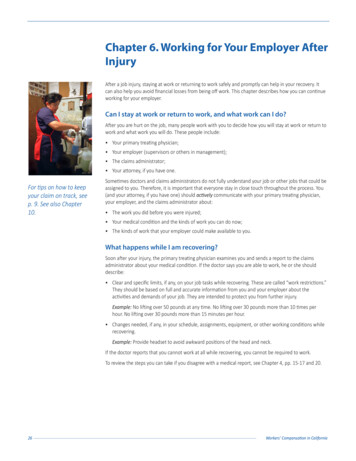
Transcription
Strategic WritingAIMS OF THE CHAPTERThis chapter introduces a rhetorical approach to college writing. Rhetoric isthe study of effective communication in specific situations. A rhetorical ap proach emphasizes that writing is a way of acting in situations. In college,most of your activity is communicative; you learn by listening and talking,by reading and writing. Becoming more skillful in these activities will helpyou become more involved and give your efforts more personal meaning.The concepts presented in this and the next chapter should help you de velop terms to describe the rhetorical situations in which you find yourselfand the goals you may wish to accomplish in those situations.KEY POINTS1. Writing is rhetorical: an action you take when you participate in a spe cific situation.2. Rhetoric has its origins in the classical world, but two cultural changessince then affect your current rhetorical situation in college: The rise of schooling and literacy The specialization of knowledge and professions3. In school and life we learn many strategies of minimizing our own feel ings to please others. However, your success as a writer in college andelsewhere depends on your overcoming these strategies of disengage ment so that you become more involved in your activities.4. Involvement comes from finding out what is important to you and thenacting on what you have found.
Part One Writing Your Self into College3QUESTIONS TO THINK ABOUT How is writing different in different situations? How might collegewriting differ from the writing you did in high school? How do thegoals differ? How do the styles differ? When have you felt most involved in learning? When have you feltleast involved? Has the chance to discuss and write about what you arelearning and thinking made a difference in how involved you feel? What do you hope to get out of your education? What does writinghave to do with accomplishing those goals? AJ A First-Day AssignmentOn the first day in writing courses, students are often asked to write somevariation of the following assignment. You might take fifteen minutes andtry it.Write a paragraph introducing yourself to your instructor andyour classmates. Tell about your previous experience in this subject,what you enjoy doing in school and out, what concerns you, andwhat your ambitions and goals are.Although you know many things about yourself, this may not be an easy as signment to write. It raises questions about which you have little informationon the first day of the term, perhaps even on your first day of college classes.Who are the people you are writing to? How will these strangers respond towhat you write? What will this class be like? What will college be like? Whatimpression will people get from your writing? What impression would youlike to give in this class? What role and identity would you like to establishin college? This assignment asks to give a picture of yourself, but until youknow more about the situation, you may not feel at all sure about what kindof picture you want to draw. So writing this assignment is not just a matter ofsimple description but rather a matter of self-presentation in a social situa tion.One way to handle this assignment is to take no risks and just remainfriendly.Hi. I'm Bill Stanley, an eighteen-year-old freshman at State Uni versity. I graduated last year from Franklin Roosevelt High School,where I most enjoyed my courses in math and science. I also playedtrombone in band. I have always gotten good grades in English, al though I find writing difficult. Teachers tell me I ought to be moredescriptive, but I say why waste words once you get your ideaacross. I hope to major in biology and go on to medical school.
4Chapter OneStrategic WritingThis does what is asked, gives some details, and leaves Bill Stanley's op tions open. But it does not announce that Bill will be an enthusiastic andmemorable participant in this course. In order to take a more emphatic placein the class, another student might take a more challenging stance, but stillgive no important facts.Yes, here I am. Writing again. In another English class. Tellingyou who I am. I love writing, but I sure am tired of this assignment.Sure I came from some high school. Sure I like some subjects, anddidn't like others. I got good enough grades to get into college, so Icould do the work. But this isn't what is important about me. Whatis important is that I am looking - looking for new ideas, lookingfor a style. I listen to music that's at the edge, I read stuff you'llnever find in school, I live in cyberia. Will I find what I am lookingfor here or will this be just one more dull English class?Rachel "Razzti" RasmussenDo you think either of these responses gives a full or revealing picture of thestudents who write them? What kind of response do you think might startsomeone off well in an unknown situation? Are there any things about thesituation that might help you decide how to represent yourself?There is no right or wrong way to handle this assignment, but any wayyou choose starts to establish your identity in the conversations, written andspoken, that will take place in the class throughout the term. What makesthis assignment difficult and makes any response likely to look a little bitfoolish is that the conversation hasn't yet taken place, so you are writing aspart of a relationship that is only beginning. This is as tough as introducingyourself to a stranger at a party.Writing for people you don't know in a situation you don't understandis the hardest writing to do. Every time you learn more about a situation andthe people you are writing to, you understand better what you want to ac complish, what you want to say, and what will work. Writing is not an ab stract skill that is always the same; it is strategic communication to fit thecircumstances. How can you know your strategy until you know the circum stances? Writing as RhetoricEach of you making it to a college classroom has succeeded in many situa tions where you have needed to write. You wrote well enough to completethe tasks required of you. Even more, you expressed yourself, your knowl edge, and your ideas in ways that helped you develop and interact with oth ers. You wrote in high school for your teachers, in letters to your friends, onshopping lists to take with you to the store, or in diaries to yourself. Youfound ways of getting by, meeting your needs in each of those situations sometimes spectacularly, sometimes just adequately. But you did find a way.
Part OneWriting Your Self into College5Why then must you study writing one more time? Why does learning towrite never end? Why isn't it enough to say, "Now I know how to write, andI'm done with it"?Learning to write never ends because you keep encountering new kindsof situations. Whereas in high school you may have used materials fromyour American history textbook to write an exam question about Lincoln'sactions in the Civil War, in college you may be asked to argue, using evidencefrom personal letters, that Lincoln issued the Emancipation Proclamation forpolitical motives rather than as an act of moral leadership. If you then be come a publishing historian, you may argue in a book that Lincoln was morea politician than a statesman. These examples are all just within one field ofhistory. Legal briefs or management reports or chemistry research articleswill be done for totally different situations requiring different skills, re sources, and motives. As situations change, so must writing; in other words,writing is rhetorical. Writing must speak to each situation, to the particularlocal circumstances, to be successful.Abraham Lincoln's 1858debates with StephenDouglas spoke to thepolitically and morallycharged atmosphere inthe United States justbefore the Civil War.Image removed for copyright reasons.
6Chapter One-ngforReflectionStrategic WritingThis is the first of a series of Writing for Reflection assignments that ap pear throughout the textbook. These assignments are intended as infor mal ways to think through your own experience of writing and learningin relation to the ideas presented in this book. They need not be formalessays. Here is the first assignment:To gain a clearer picture of your writing experiences before coming tocollege, describe in a few paragraphs the various kinds of writing youhave had to do in school and out. In each case describe the situation youwrote for (for example, at the end of a term in a world history class, for acommunity newspaper, or as part of a political campaign), the kind ofwriting you did (for example, a biography of a writer, a sports newsstory, or a sales brochure), and how that kind of writing fulfilled theneeds, demands, or opportunities of the circumstances.Rhetorical SituationsAs the preceding discussion has made clear, rhetoric is the practical art ofmaking successful statements in specific situations. If the purpose of com munication is to interact with others - to influence, to cooperate with, to op pose, to control, to comply with, to negotiate - then you have a greaterchance of success if you think about the following points: What the situation isWho you are communicating withWhat you want to happenWhat ways you might achieve that endHow can we use language in purposeful, practical ways to achieve ourgoals? That question is the heart of rhetoric.Successful communication varies from person to person and situation tosituation. There is no simple, single "good rhetoric," no one way to write.You must always think about the specifics of the situation: what you want toaccomplish, with whom, and through what available means.In college you will find yourself writing in a variety of new situations,and you will need to think through how you want to respond to them. Thatis, you will need to develop a "rhetoric for college" - a way of thinkingabout your writing for the next few years that will help you get what youwant out of college and also satisfy the writing demands college places uponyou. At other points in your life you may need to develop a rhetoric for yourprofession, a rhetoric for sales, a rhetoric for managing people, a rhetoric forcity politics, a rhetoric for talking to your children, or a rhetoric for talking toyour loved one. Right now, however, your most pressing need is likely to bea rhetoric for college writing.
Part OneWriting Your Self into College'fU;ngforReflection7Make a list of the kinds of situations where people have to speak or writeto carry out their part in an activity, such as chatting as part of a pleasantdinner with friends, making a statement at a public meeting, filling out aform to apply for a job, or writing a letter to publicize the work of yourorganization. T hen in a few phrases for each, characterize how peoplemight use language in each situation and what strategies might be suc cessful. For example, at a dinner people might try to be pleasant and hu morous while sharing stories about themselves and mutual friends.The Origins of RhetoricMany societies around the world have recognized that how people use lan guage is related to who they become, how they are viewed, and what theyaccomplish. Traditional sayings in many cultures offer advice about how tospeak in public and private. Hindi traditional lore, for example, counsels,"Write like the learned; speak like the masses." Thai wisdom advises, "Tospeak well one must reflect, and to hit the mark one must aim." Turkish lore,however, warns that people are not always happy when you tell them thetruth: "He that speaks the truth must have his foot in the stirrup."As literacy developed in various cultures, treatises on education often in cluded language education as an important part of the training of leaders.For example, the Chinese scholar Liu Xie wrote "The Cultivating of the Mindand the Carving of the Dragon" (Wen Xin Diao Long- literally, "patternmind carve dragon") around 500 A.D. To become a dragon - that is, a wiseand powerful leader - one needs to carve out a patterned mind by learninghow to use the written language. (For more information, see H. Zhao,"Rhetorical Invention in Wen Xin Diao Long," Rhetoric Society Quarterly 24(1994), pp. 1-15.)Ancient Greece and Rome developed an extensive and organized bodyof thought about how to communicate successfully and how to help peoplerepresent their interests within the new political institutions of democracyand republic. Since reading and writing were not widespread in this period,even among the elite class of citizens, rhetoric first developed in relation topublic speaking.In public speeches, people accused of crimes needed to defend them selves; members of the consul needed to persuade others of their proposedpolicies and laws; and people needed to be brought together with commonbeliefs and values. These three forms of talk, all having their origins in theagora - or marketplace where citizens came to meet and talk - were tasksof argument and persuasion. Most of classical rhetoric's concepts and guide lines are especially applicable to the forums of democratic government. To day, our courts, legislatures, and politics are similar to, and even patternedafter, classical models. It is no accident that courthouses, legislatures, andgovernor's mansions look like Greek and Roman buildings.
8Chapter One Strategic WritingThe speeches ofMarcus Tullius Cicero(106-43 B.C.E.) were apowerful influence onthe Roman Senate andpublic.Image removed for copyright reasons.To highlight some of the most useful concepts that have developed in therhetorical tradition, throughout this book there will appear definitions andexplanations of key rhetorical terms in places where they are most relevant tothe topic or activity being discussed (see the list below). The last chapter inthe book on argument will draw together many of these concepts. USEFUL CONCEPTS FROM RHETORICThe types of rhetoric 9Decorum 13Dramatism 29Rhetorical situation and rhetorical timing 42Sentence combining 130Key question words 136
Part OneWriting Your Self into CollegeGenre 209Intertextuality 231The three moves in research article introductions 269Stasis, where disagreements meet 302Logos, ethos, and pathos 346Identification 349Common Places 354@/C)USEFUL CONCEPTS FROM RHETORICThe Types of RhetoricClassical rhetoric was developed to help in three kinds of publicspeech situations common in the classical world, all of which stillcontinue in the modern world.Courtroom or forensic rhetoric - the strategic use of language to accuseor defend a person concerning misdeeds or crimes. It is practiced today in court cases.Legislative or deliberative rhetoric - the strategic use of language topersuade people to take particular actions or adopt particular laws. Itis practiced today in legislatures, editorials, and debates.Political or epideictic rhetoric - the strategic use of language to praiseand blame people in order to encourage and discourage behaviorsand beliefs or to reinforce values in the community. It is practiced today in sermons and political rallies.forReflectionTo explore how well the three traditional categories of rhetoric - forensic, deliberative, and epideictic- cover the range of public and personalspeaking and writing today, identify one place where people communicate frequently (such as a classroom, a coffee shop, a church or temple, anoffice, a newspaper, or a talk radio channel). Either from memory or byrevisiting the location, make a list of the different kinds of messages people present. Then develop categories for the different kinds of languageused. Do the three categories of traditional rhetoric fit, or do you need todevelop other categories? Describe your findings in a few paragraphs.Then in a class discussion compare your findings and thoughts about thelocation you examined to the findings and thoughts of other class members who examined different locations.9
10Chapter One Strategic WritingCourtroom lawyersengage in forensicrhetoric as they arguefor the guilt orinnocence of theaccused. Here JohnnyCochran argues for theinnocence of O.J.Simpson.Image removed for copyright reasons. /CJ Rhetoric in a Changing World: Literacy,Specialization, and TechnologyAlthough aspects of modern American life are deeply influenced by Greekand Roman models, life today has also changed from classical times. Thus al though we may find that many concepts of traditional rhetoric help us un derstand contemporary situations, we also need new concepts to fit our newways of communicating. One major change especially relevant to college isthe rise of literacy. Reading and writing have joined listening and speakingas major forms of communication. Today, although talk certainly takes placeat all levels of education, much of schooling is defined by the books you readand the papers and tests you write.Whereas the spoken word tends to be more personal, the written wordcan travel through time and space and can be multiplied in many copies, in fluencing more people over a greater distance in a more enduring way. Forthese reasons, the written language has become central to major institutionsof society. Religions are based on holy books, and legal systems are based onwritten codes, contracts, and records. Governments rely on regulations, or ders, and information. Sciences formulate in writing knowledge about theworld we live in. Journalism records news and trends. Literature offersbooks for entertainment and enlightenment.The development of printing five hundred years ago has made booksand other printed material cheap and readily available. In turn, literacy the ability to read and write - has become more necessary for all aspects of
Part OneWriting Your Self into College11life. Schooling developed to meet that need for literacy. Reading and writingbecame not only subjects of instruction but central activities in all courses ofinstruction. The basic 3Rs - reading, 'riting, and 'rithmetic - are all funda mentally literate practices - paper and ink operations. All school coursesare structured through written syllabi, plans, guidelines, and catalogues.Even classes that emphasize physical skills such as flight training or labora tory technique have lesson plans, textbooks, manuals, and written exams. Sodoing well and getting what you want from college is very much a matter ofreading and writing.Although electronic communication technologies, starting with the tele graph and telephone over a century ago, have changed our life, they have notdisplaced literacy. In fact, the latest tools of the electronic revolution, com puters and computer networks, seem to have led to a proliferation of thewritten word, as word processing has made composing and revision easier,electronic databases have increased access to written information, and on line networks have increased the rapid exchange of text. Written communi cation flows across the Internet, from the most informal e-mail jottings to thecomplete texts of literary masterpieces and scholarly essays. The most recentdevelopments in computer technology are supporting the combination ofwritten word, sound, and picture. Reading and writing are becoming seam lessly integrated with other modes of communication. Even the programsthat direct electronic representation are written, in the specialized languagesof programming.A second change has been the development of specialized professionsand disciplines (that is, specific areas of study such as biology, sociology, andhistory of art), especially in the nineteenth and twentieth centuries. Each ofthese communities has developed specialized ways of using the written lan guage to carry out its work. A medical doctor writing a patient's case recordwrites differently than a literary critic evaluating a novel. A lawyer writing acontract writes differently than an engineer writing a technical report. What ever your chosen career, you will notice that people in that field have specialways of communicating with each other using particular styles and vocabu laries. At college your education is likely to be organized by disciplines, inwhich you learn the information and the ways of communicating appropri ate to each. Most probably you will have to declare a major, identifying a spe cific discipline that you will study more intensively and adopt more fully asa mode of communication.These two changes, the rise of literacy as a school-taught skill and in creasing specialization, influence the kind of rhetoric that you will need todevelop for college - a rhetoric for written language as used in schools ofhigher education, organized along disciplinary lines. Your reading and writ ing, influenced by the disciplines of the courses, are framed within the struc ture and practices of a classroom. Although you may read about biology andmay even read articles from biology journals, much of what you read is intextbooks, much of what you write is for assigned papers and examinations,and usually your goal is to demonstrate your knowledge and share your de veloping thoughts with your instructors. Thus a rhetoric for college is as
12Chapter OneStrategic Writingmuch attuned to the work of the classroom as it is to the work of the profes sions and disciplines.iting forReflectionWrite several informal paragraphs on the various technologies you usefor communication (from speech and pencil and paper through the latestelectronic tool), on what occasions you use them, and how you use them.Be as specific as possible. For what kinds of communications do you usethe telephone? What kinds of documents do you write on word proces sors? What interactions do you carry out only by face-to-face talk? Haveyou ever made a video, or do you just watch commercially produced tele vision? Then, in class discussion, compare your observations with thoseof your classmates.Rhetoric and Decorum in Daily LifeAll of us already know a great deal about rhetoric because we learn and uselanguage to interact with each other. From earliest childhood we assess theeffect our words and actions have on others. We learn who answers our re quests by doing something for us, who tells us to do it for ourselves, who ig nores us, and who gets angry. We adjust our behavior accordingly, learninghow to talk to different people. We also learn at what times our parents willlisten to us, when we will be told to hush up, or when we will be put off withan absent-minded nod. On the basis of this knowledge, we often consciouslyjudge what to say. We learn what kind of comments may meet with approval,rejection, and irritation. Thus we start to learn about audience, timing, andgoals within various situations.We also have learned about forms and styles appropriate to different sit uations -when to say "please" and when telling a joke fits the situation,when to be precise, and when to be informal. We learn how to talk in theImage removed for copyright reasons.
Part OneWriting Your Self into College13classroom, or the schoolyard, how to write a history exam, or a literature essay,and how to write a letter to our aunt. Communication and behavior appropriate to a situation is known as decorum (for more on decorum, see below).For each of these situations you have developed a strategy for maximizing the results for yourself. Sometimes it may have been to keep a low profile, to stay out of trouble, and to not upset anyone. You may even have beenrewarded for passivity with praise for seeming cooperative. In other situations you may have found the most pleasure from fitting in, trying to talk orwrite like everyone else around you so you feel accepted. Sometimes yourstrategy may have been to follow the explicit instructions of an authority andeven to anticipate the authority's desires, saying or writing whatever youthink will please the authority. All these are strategies of going along on apath laid out by others.On the other hand, sometimes you may have created your own path andhave sought strategies that defined your individuality. You may have takenrisks to define your own point of view, reveal your own observations, question something others believe, request something you really want, or opposesomething that you dislike. In doing so, you have brought a difference intothe situation that sets your statement apart. This is known as saying something.@/C)USEFUL CONCEPTS FROM RHETORICDecorumDecorum, or the use of language and behavior that fits a situation, isa much richer concept in rhetoric than the usual use of the word.Today we usu ally associate decorum with polite, serious, respectful behavior, such as authorities would like to maintain in classrooms orcourtrooms. Sometimes we associate decorum with etiquette, which is aformal set of rules for polite behavior in formal social circumstances. However, in rhetoric decorum can be any behavior that fits the circumstances,so one can also speak of the decorum appropriate to a loud dance party, afootball game, or a raucous political argument.Decorum is attuning yourself to the circumstances. It can includeeverything from learning to write a history paper that sounds like it comesfrom a skilled history student to learning how to write a script that soundslike it belongs on the evening news. Decorum doesn't limit what you cansay or do, but just helps you find a tone, style, and vocabulary that will berecognized, acceptable, and effective as part of the unfolding situation.
14Chapter One /c)Strategic WritingThe Strategy of GrowthEvery student who has gotten as far as college has developed automaticways of adjusting to the decorum of the classroom, of getting through eachschool day without too much risk and with a moderate amount of success.For many students, this strategy of getting by may have become so habitualthat it no longer seems like a strategy- it just seems a natural response tothe situation.It is worth thinking through this position within each college classroom.Paying attention to spelling, grammar, and well-organized paragraphs willkeep you from losing points for making a mistake, but if that is all you arepaying attention to, you have not yet begun to communicate. If you listencarefully to the teacher's statements only to repeat them, you may be markedcorrect, but you have not yet begun to grapple with the ideas and informa tion. If you give the teacher exactly what you think the teacher wants, theteacher may be pleased with what you say, but there is no dialogue. Theteacher cannot respond to what you are really thinking and cannot speak toyour real questions, concerns, and differences of opinion.As you grow older and have more experiences, your understanding ofyourself becomes richer, your skills and knowledge increase, and your inter ests become deeper. At this point superficial cooperation becomes less satis fying. You naturally want something more involving and challenging.In your relations with your friends and classmates you are all discover ing new facts, encountering new ideas, confronting new problems, and find ing new directions. Although you may want to be accepted in a crowd whereyou can relax, tell jokes, and go to the movies, you may also want to developrelationships where you can share the changes in your life. Sharing what youare going through demands a greater involvement and investment of your self and your own concerns than just telling jokes and making pleasant com ments. With certain close friends you may develop a more honest andinvolving kind of communication based on a trust that they will respect whatyou say, no matter how different and personal.Just as you are demanding more from your life, teachers look for morefrom you. Their expectations are higher. Although college teachers may con tinue to pass students who follow orders and do little else, such students donot catch their personal attention or get the best grades. Teachers start askingyou for original thinking, novel problem solving, and honest engagement,asking you to go beyond the safe minimum. They will be starting to prepareyou for professional life, where you will have to make confident, personaljudgments on difficult cases, judgments that must hold their own beforeother professionals.Because of this, both your own needs and the demands of the situationsuggest that you put more of yourself on the line, but in a way appropriate toeach situation. Putting yourself on the line does not always mean being con flictual or oppositional but rather identifying where you stand, elaboratingyour position, and offering reasons. At times learning the power of the con cepts and approaches offered by a discipline and instructor may provide the
Part OneWriting Your Self into College15greatest growth and excitement, with you feeling you have little to add; eventhen, however, you still need to identify how you are perceiving the materialand what you are getting from it.To get the most out of college, you need to set your own directions. Afterall, although you were required to attend high school, you have chosen to beat college, and you have chosen the particular college you are in, and that college has chosen you. You choose your classes (often there are options evenwithin course requirements), and you choose your major. So lying low nolonger makes sense. What makes sense is taking the risk to become who youare becoming, to become personally involved in your learning.To help you identify the kinds of independent stances you have createdthrough language, describe one or more incidents where you took a standcontrary to what other people in the group expressed or approved. Thiscould be with parents, peers, community groups, or teachers; in classes orclubs; or in any other situation where you used language to identifywhere you stood apart. Describe the particular tactics you used to expressyour individual position and the reaction others had to your statement.@/aBecoming Involved Through WritingResearch indicates that student success in college is
Strategic Writing AIMS OF THE CHAPTER This chapter introduces a rhetorical approach to college writing. Rhetoric is the study of effective communication in specific situations. A rhetorical ap proach emphasizes that writing is a way of acting in situations. In college, most of your activity is communicative; you learn by listening and talking,










